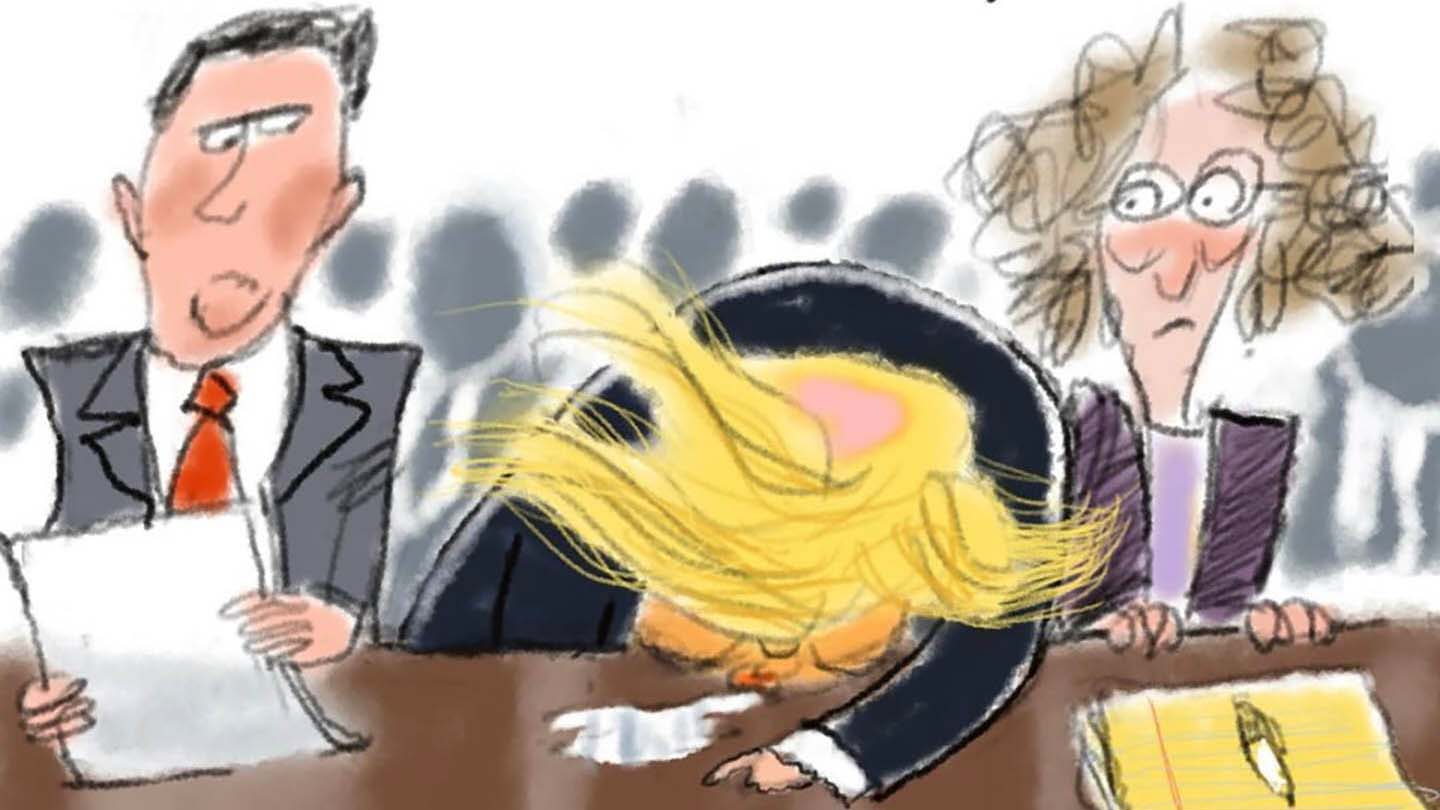Where Is the Leftist Critique of Hamas?
What is the view of most of the organizations and activists in the Palestinian solidarity movement about Hamas? The answer remains unclear—and rarely talked about.
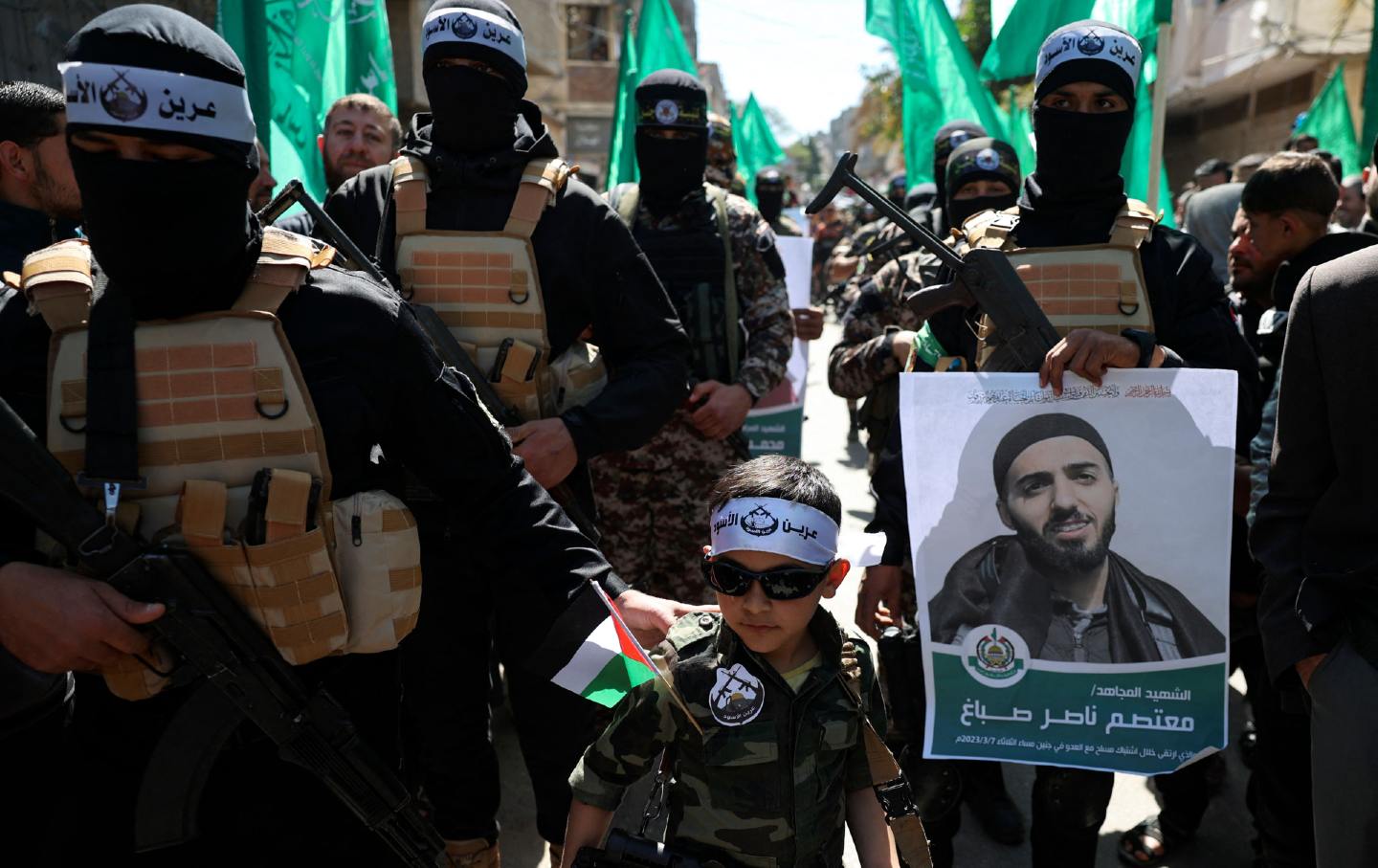
One of the things that mystifies me as an Israeli leftist (yes, Virginia, there are leftists in Israel), is the lack of an international leftist critique of Hamas.
Judith Butler said in a panel in Paris on March 3, “We can have different views on Hamas as a political party, we can have different views on armed resistance, but I think it is more honest and historically correct to say that the uprising of October 7 was an act of armed resistance.”
But what does Butler have to say about the nature of Hamas as a political party or movement? If we have “different views” about them, what is her view? It’s not clear.
And I will add, what is the view of most of the organizations and activists in the Palestinian solidarity movement about Hamas? Also not clear—and rarely talked about.
I say this as an Israeli who believes that the occupation of the West Bank, Gaza Strip and East Jerusalem is evil and must end. And for that to happen, in addition to the need for a different Israeli government and serious pressure from the Biden administration and the international community, we also need a realistic Palestinian partner.
Hamas is not that partner. According to its own ideology, Hamas wants an Islamic Palestinian state, run according to Sharia (Muslim religious law), “from the river to the sea.” While Hamas defines itself as a national movement struggling for Palestinian rights, it also is clearly a fundamentalist Islamic movement, the Palestinian branch of the Muslim Brotherhood that was founded in Egypt. Therefore, it is not simply a Palestinian liberation movement but also a fundamentalist Islamic movement. Is that what the primarily secular American and international left wants? Don’t they believe in the importance of separation of church (religion) and state—a principle currently being challenged by the MAGA movement and evangelists in the United States? As it is by the settler movement here in Israel.
For those who are not familiar with it, the original Hamas charter when the movement was founded in 1988 was clearly antisemitic, fundamentalist, and totally opposed to compromise with the State of Israel. It stated “that the land of Palestine is an Islamic Waqf consecrated for future Moslem generations until Judgment Day. It, or any part of it, should not be squandered: it, or any part of it, should not be given up.” It also stated, “The Prophet, Allah bless him and grant him salvation, has said: ‘The Day of Judgement will not come about until Moslems fight the Jews, when the Jew will hide behind stones and trees. The stones and trees will say O Moslems, O Abdulla, there is a Jew behind me, come and kill him.’” So it was clearly against the right of the State of Israel to exist alongside a Palestinian state, and it was also clearly antisemitic. The charter recognized the Palestine Liberation Organization as a brother organization in the struggle (Hamas is not a member) but rejected the PLO’s secular character and support for a democratic secular state, since it asserted that “we cannot give up the Islamic identity of Palestine.”
Winning the Palestinian parliamentary elections in 2006, Hamas took over total control of government of Gaza after a vicious civil war with Fatah that included throwing Fatah activists off roofs of buildings and shooting them in their kneecaps so they couldn’t walk again. In 2017, Hamas published a revised version of the charter that expressed support for “a fully sovereign and independent Palestinian state, with Jerusalem as its capital along the lines of the 4th of June 1967, with the return of the refugees and the displaced to their homes from which they were expelled, to be a formula of national consensus.” However, it did not express a readiness to recognize the existence of the State of Israel. It also removed the clearly antisemitic elements in the first charter, saying that “Hamas affirms that its conflict is with the Zionist project not with the Jews because of their religion.”
At the time, Hamas proposed a hudna (long-term cease-fire) with the Israelis, even up to 50 years. In response, the Israeli government, perhaps understandably, said it would only agree to a full peace agreement with the Palestinians like the ones Israel has with Egypt and Jordan.
Was that a mistake, a missed opportunity on the part of Israel? Perhaps. Then again, the fact that Palestinian President Yasir Arafat didn’t accept Israeli Prime Minister Ehud Barak’s offer at Camp David in 2000, and that Palestinian President Mahmoud Abbas didn’t say yes to Israeli Prime Minister Ehud Olmert’s even more generous offer in 2007–08—weren’t those mistakes as well?
Israelis and Palestinians share responsibility for missed opportunities.
On September 30, 2021, a few months after one of the periodic Israel-Gaza mini-wars, Hamas organized the “Promise of the Hereafter” conference at the Commodore Hotel in Gaza City, which dealt with the group’s plans for the day after the conquest and destruction of the State of Israel and the establishment of a Palestinian state in its place. In April 2024, senior Fatah members based in Cairo told Haaretz journalist Shlomi Eldar that they thought the Hamas people were crazy when they came to them after the conference suggesting that they assume responsibility for professional roles in the new Palestinian state that would replace Israel.
We now know that Hamas was preparing the October 7 attack for more than a year. Was its goal to strike a blow at the Zionist enemy, to prevent a normalization agreement between Israel and Saudi Arabia, to demonstrate that violence, and not diplomacy, was the only way to successfully struggle for Palestinian rights? Possibly a combination of all of the above and more. And it also knew that the Israeli military response, with a vastly superior force, would be deadly for the Palestinians in Gaza. To my mind, one of the most astonishing comments about the situation came from senior Hamas official Mousa Abu-Marzook. When asked by a foreign reporter why Hamas didn’t use its extensive tunnel infrastructure to protect the Palestinian civilians from the Israeli attack, he responded, “Protecting Gaza civilians is the responsibility of the United Nations and Israel.… We have built the tunnels to protect ourselves from getting targeted and killed.”
We also know—according to the polls by Dr. Khalil Shikaki, director of the highly respected Palestinian Center for Policy and Survey Research in Ramallah—that over 70 percent of Palestinians believe that the Hamas attack on October 7 was correct. However, that doesn’t mean that 70 percent believe in Hamas’s Islamic ideology. That support exists because the attack placed the Palestinian issue back on the agenda after it had been ignored for so long by the Israelis and the international community, and it delivered a blow to Israeli hubris. That same majority also denies that Hamas committed the clearly documented atrocities against Israeli civilians, men, women, and children on October 7. And yet, according to the latest March poll by PCPSR, support for Hamas as a political party has fallen to 34 percent among Palestinians in Gaza and the occupied West Bank, a 12-point drop from December 2023. And courageous Haaretz journalist Amira Hass, the only Israeli journalist who has actually lived in Gaza for a period and who is constantly branded a traitor by Israeli rightists, wrote an April 1 article based on conversations with her contacts about how Gazans hate the local Hamas leader Yahya Sinwar for bringing all this death and destruction upon them.
None of what I have written above is meant to justify Israel’s response to the October 7 attack, carried out by the most extreme government in the country’s history.
There is no doubt that the messianic religious fundamentalists represented by Finance Minister Betzalel Smotrich and his National Religious Party, and the racist followers of Rabbi Meir Kahane—National Security Minister Itamar Ben-Gvir and his Jewish Power Party—are Jewish fundamentalist mirror images of the Palestinian religious fundamentalist Hamas in Israel. Smotrich’s 2017 “Decisive Plan” is the Israeli version of the exclusivist Hamas approach to the future of Israel/Palestine. Many Knesset members of Netanyahu’s Likud party also have the same approach.
Popular
“swipe left below to view more authors”Swipe →All Israelis went into a collective state of shock on October 7—the worst, most deadly day in Israeli history since the establishment of the state in 1948: over 1,200 people killed, over 2,500 wounded, 251 hostages, southern kibbutzim and towns overrun for a few days, and over 150,000 people displaced from their homes.
It was clear that Israel was going to respond militarily. The army had to make up for its intelligence and strategic failure on October 7. And the government, which had a total systems collapse in the first few days while all support for the families affected by the attack was provided by civil society, felt it had to order a retaliatory strike against Hamas to reassert Israel’s deterrent capacity. Many Israelis were also feeling a primordial rage for revenge after the atrocities that were committed that day.
However, as the campaign has entered its sixth month, it is clear that this is not just another typical Hamas-Israel round of fighting. The devastation in Gaza is immense, and by March at least 32,000 Gazans have been killed—the majority being civilians, men, women and children, with at least two-thirds of the 2.3 million population displaced from their homes. Much of international public opinion is understandably aghast at the level of death and destruction, while most Israelis haven’t even seen it since—with the honorable exception of Haaretz—the mainstream electronic and print media in Israel have been focusing on our pain, stories about those who died on October 7, the 100-plus remaining hostages and their families, the Israelis displaced from their homes in the south and north, and young soldiers who are dying almost every day.
And it is clear that both Hamas on October 7, and Israel since the beginning of its massive military response, have committed war crimes.
Now, the challenge is to end the fighting as soon as possible, to find a way to release the remaining Israeli hostages who are still alive, and to begin the process of rebuilding Gaza. The Arab countries, the European Union, and the American government have all said that they are not ready to invest in rebuilding until there is path to an end to the conflict. That requires a clear path to an end to the occupation and the creation of a two-state solution, a Palestinian state based on the West Bank and the Gaza Strip with East Jerusalem as its capital, alongside the State of Israel. That is still possible, with the addition of a 4-5 percent land swap which would include 80 percent of the settlers within the sovereign state of Israel, neutralizing them as a problem.
However, any notion of a possible Israeli readiness for a one-state solution is a pipe dream. Both Israeli and Palestinian society are living in a state of tremendous trauma, filled with anger at the other. If the Czechs and Slovaks, the Indians and Pakistanis, and all the components of former Yugoslavia couldn’t stay together in one state, how can anyone seriously imagine a one-state solution for Israelis and Palestinians in any foreseeable future?
Palestinians justifiably want an end to the occupation and an independent life of their own. The grass roots also aspire to Palestinian unity between Fatah and Hamas. This would require that Hamas join the PLO. The Fatah leaders say that their condition for that is that Hamas has to accept the 1993 Declarations of Principles (the Oslo Accords) between the PLO and the Israeli government, which is based on mutual recognition. Unless Hamas changes its ideology and accepts the idea of the existence of the State of Israel alongside the future Palestinian state, it cannot be a partner to a two-state solution—the only solution that can provide both Palestinians and Israelis with the possibility of a dignified and secure life.
Thank you for reading The Nation!
We hope you enjoyed the story you just read. It’s just one of many examples of incisive, deeply-reported journalism we publish—journalism that shifts the needle on important issues, uncovers malfeasance and corruption, and uplifts voices and perspectives that often go unheard in mainstream media. For nearly 160 years, The Nation has spoken truth to power and shone a light on issues that would otherwise be swept under the rug.
In a critical election year as well as a time of media austerity, independent journalism needs your continued support. The best way to do this is with a recurring donation. This month, we are asking readers like you who value truth and democracy to step up and support The Nation with a monthly contribution. We call these monthly donors Sustainers, a small but mighty group of supporters who ensure our team of writers, editors, and fact-checkers have the resources they need to report on breaking news, investigative feature stories that often take weeks or months to report, and much more.
There’s a lot to talk about in the coming months, from the presidential election and Supreme Court battles to the fight for bodily autonomy. We’ll cover all these issues and more, but this is only made possible with support from sustaining donors. Donate today—any amount you can spare each month is appreciated, even just the price of a cup of coffee.
The Nation does not bow to the interests of a corporate owner or advertisers—we answer only to readers like you who make our work possible. Set up a recurring donation today and ensure we can continue to hold the powerful accountable.
Thank you for your generosity.
More from The Nation

Princeton Students Join the Gaza Solidarity Movement Princeton Students Join the Gaza Solidarity Movement
The attempts to intimidate students underline something ominous: the erosion of democratic principles.
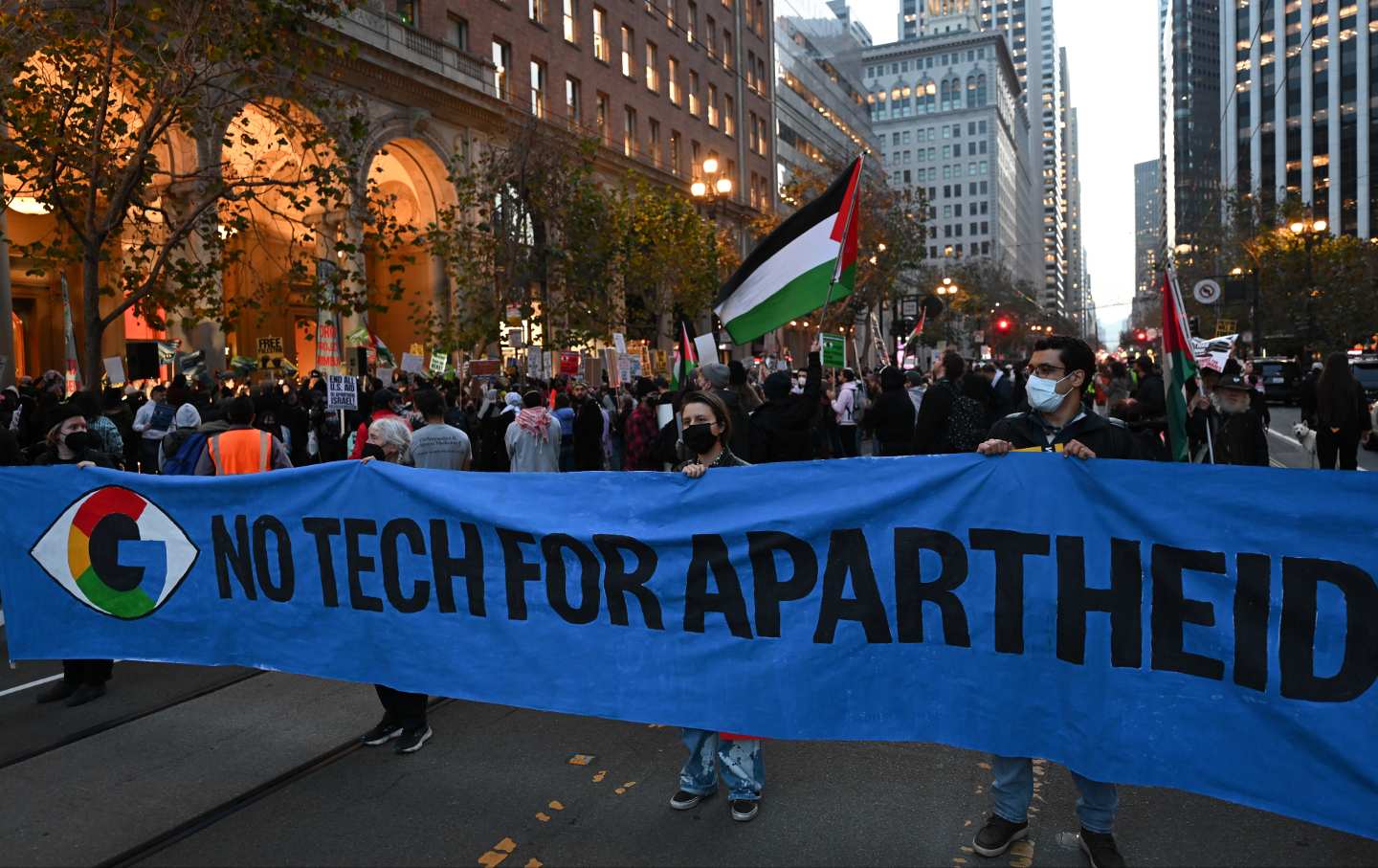
Google Fired Us for Protesting Its Complicity in the War on Gaza. But We Won’t Be Silenced. Google Fired Us for Protesting Its Complicity in the War on Gaza. But We Won’t Be Silenced.
We have been demanding that Google cut its ties to Israel’s apartheid government for years, and we’re not stopping now.
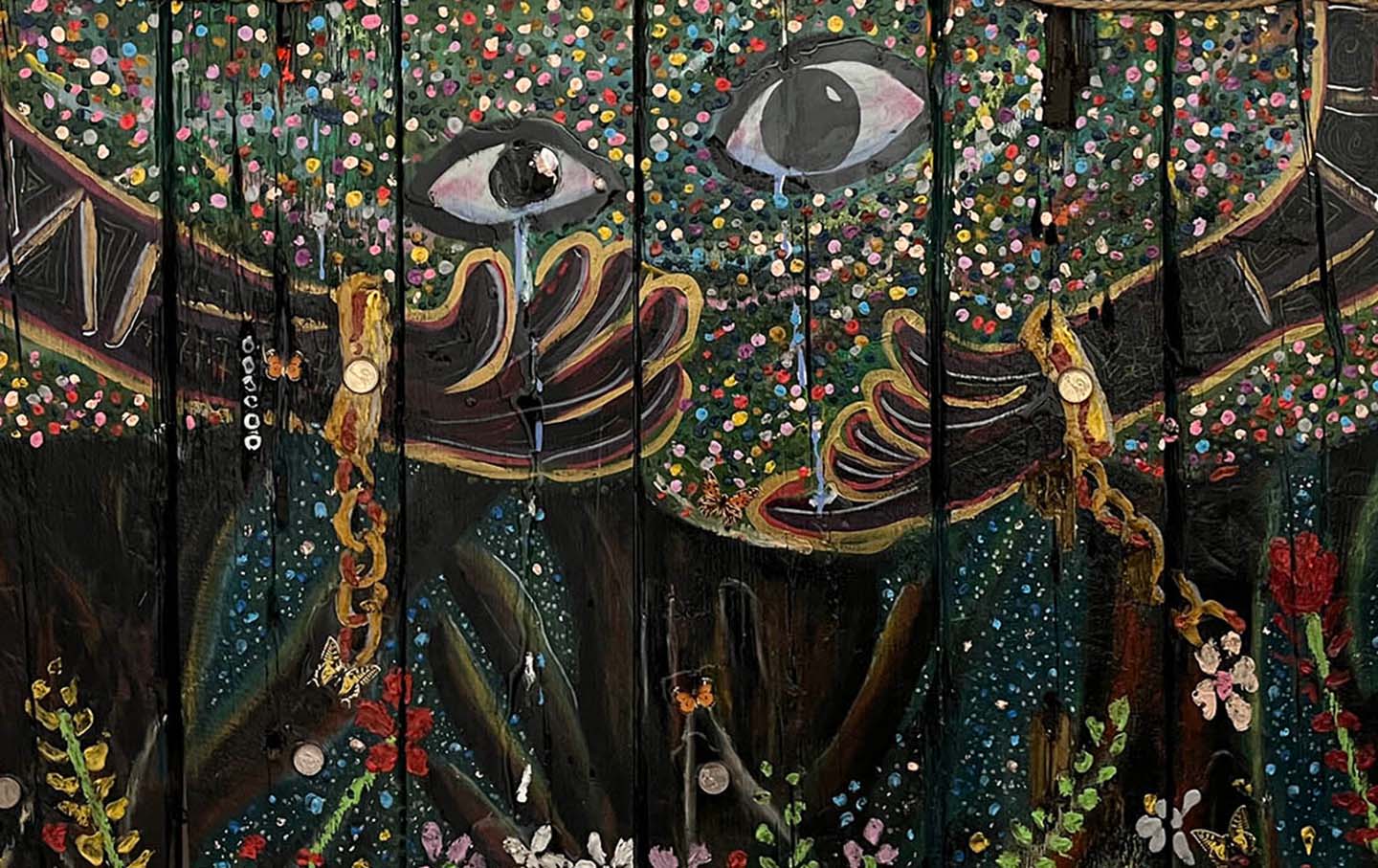
A Lifetime Sentence: Imprisoned Minds A Lifetime Sentence: Imprisoned Minds
Incarcerated people’s mental health is ignored.
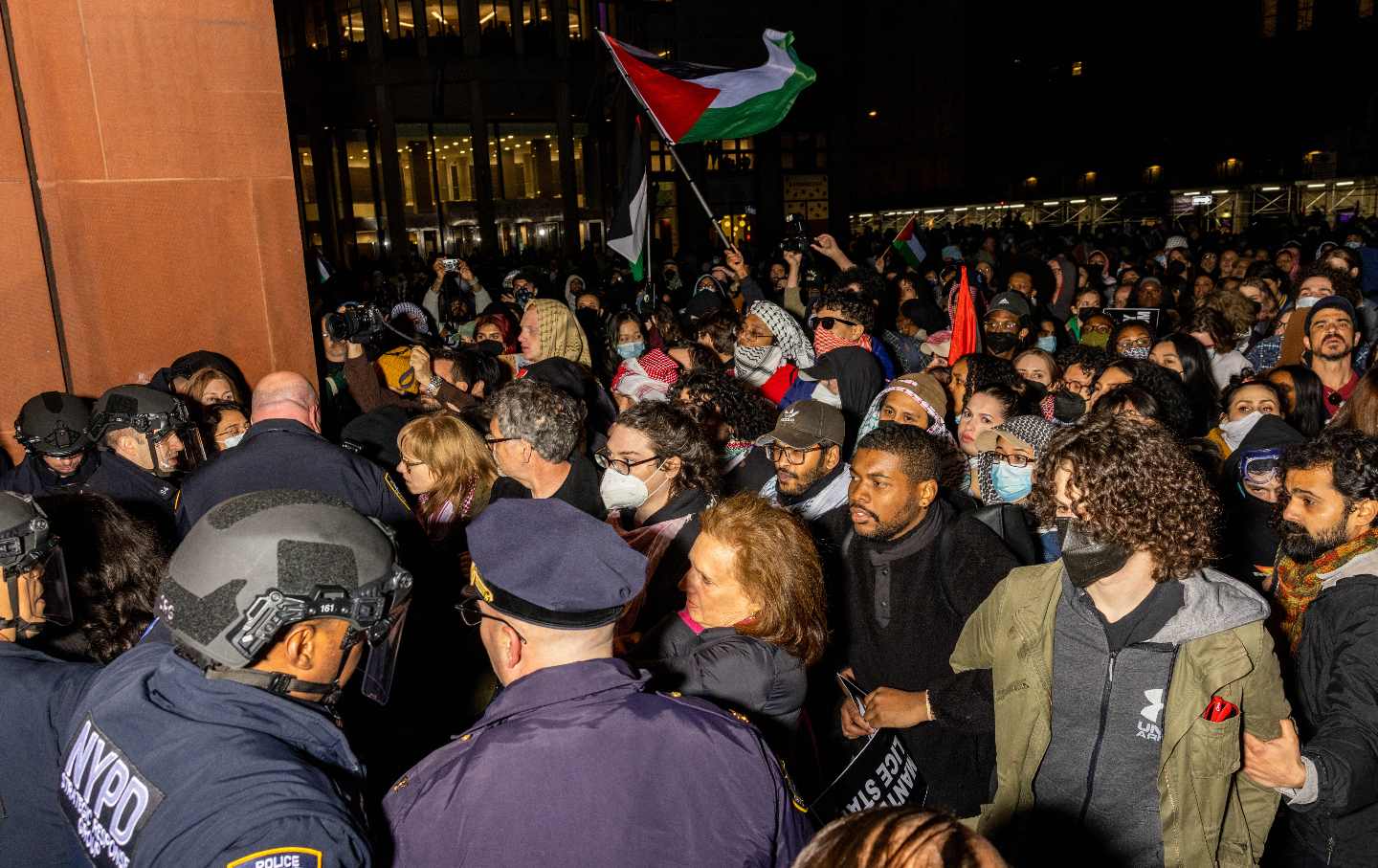
The Crackdown on Campus Protests Is Happening Everywhere The Crackdown on Campus Protests Is Happening Everywhere
Across the US, pro-Palestine students have faced repression, suspension, and arrest. We asked more than a dozen students to share how their schools have restricted the right to pr...

